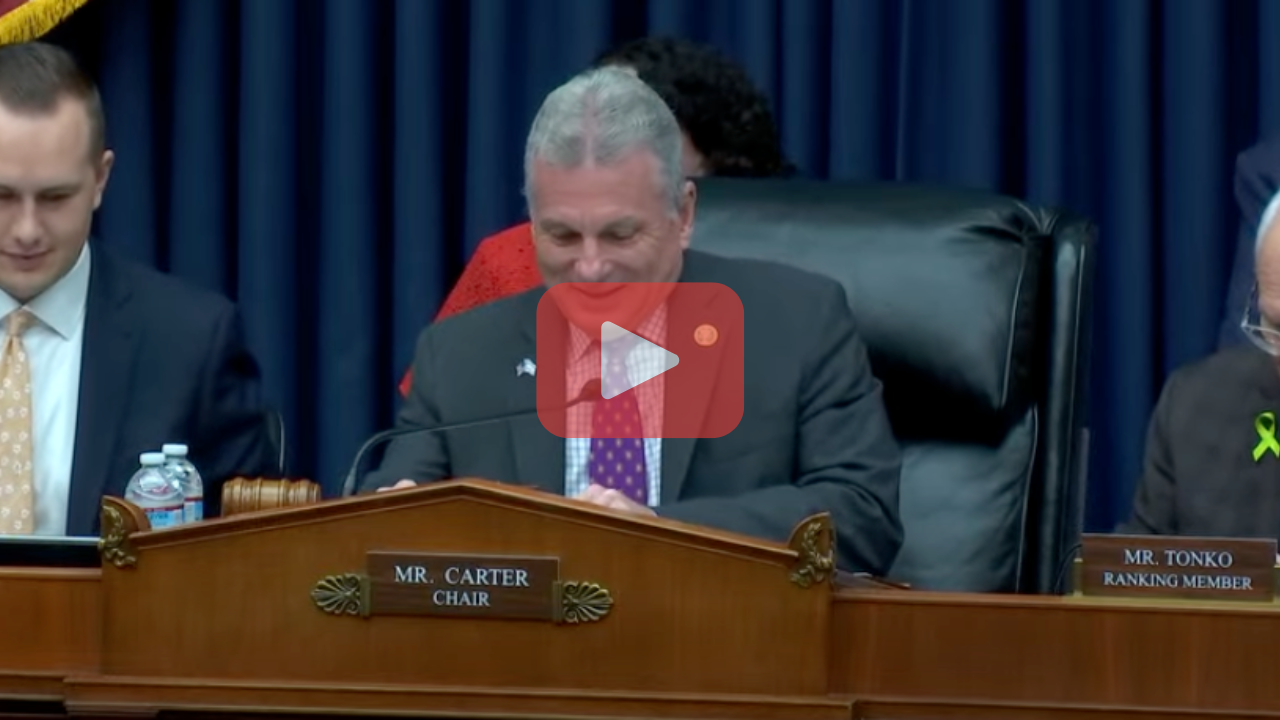Press Releases
Subcommittee Chair Carter Opening Remarks at Hearing on EPA's Harmful RMP Rule
Washington,
May 7, 2024
Tags:
Environment
Washington D.C. — House Energy and Commerce Subcommittee on Environment, Manufacturing, and Critical Materials Chair Earl L. "Buddy" Carter (R-GA) delivered the following opening remarks at today’s subcommittee hearing titled “EPA’s RMP Rule: Failures to Protect the American People and American Manufacturing."
“The RMP rule will affect producers of critical materials necessary for an innovative and prosperous American economy. “These include chemical manufacturers, petroleum refiners, drinking water and wastewater treatment professionals, agricultural chemical distributors, and other sectors which both make and provide a reliable supply of items necessary for improving lives, enhancing safety, and providing an affordable cost of living. “Unfortunately, this RMP rule appears to be another cog in EPA’s regulatory blitz; perpetuating inflation while making it harder to produce the materials and provide services Americans rely on. “Managing risk is a necessary practice for doing business in heavy industrial sectors. Owners and operators invest millions of dollars into their facilities to ensure they operate safely and at maximum efficiency with proper controls. “They have no interest—legally or financially—in becoming the face of industrial malpractice. “Despite this inherent incentive, the Biden EPA, fueled by its ideological allies’ quest for command and control, has flipped RMP on its head.” UNDERMINING AMERICAN MANUFACTURING “In taking this step, the Biden EPA is disregarding the purpose of the statute and pursuing a 'zero-risk' program. “Owners and operators of industrial facilities already operate under a General Duty Clause in both the Clean Air Act and under the Occupational Safety and Health Administration. “These provisions work to prevent and mitigate the consequences of accidents, as well as to furnish a workplace free from recognized hazards which may cause or are likely to cause death or serious physical harm. “In addition, the Clean Air Act clearly states, 'the administrator shall promulgate reasonable regulations and appropriate guidance to provide, to the greatest extent practicable, for the prevention and detection of accidental releases of regulated substances.’ “The recent RMP rule, though, goes far beyond what is reasonable and practicable for owners and operators of covered facilities. “It is not reasonable for facilities to be required to disclose confidential information to anyone living, working, or spending an undefined, 'significant' amount of time within a 6-mile radius of a covered facility. “In fact, it is a serious risk to our country’s security. “These facilities handle hazardous materials which can be exploited by those seeking to harm Americans. “Nor is it reasonable or practicable for certain chemical facilities and refineries to, in place of better training, be forced to prioritize installing new physical controls or measures on their facilities every five years or justify why they will not do so. And, being too expensive is not a justification. “Under this new RMP rule, owners and operators of these facilities must prove their safety innocence to an EPA inspector every five years, regardless of the inspector’s technical proficiency regarding plant operations.” UNREALISTIC NEW RULES “Risk management is a serious issue. We have a duty to ensure our constituents are protected from negligence and environmental hazards. “However, the pursuit of zero-risk is not reasonable, nor is it practicable. “Risk surrounds us every day. We drive cars to work, cross streets to get where we need to go, and take pharmaceuticals that may have potential side effects. “Yet, we responsibly manage these risks and reap the benefits of the opportunity they provide. “The same goes for industrial production. We must responsibly manage risks to reap the benefits of the materials they provide. “Today, we will explore the RMP rule to learn how it could impair the ability of American businesses to compete in the global marketplace and provide items we all benefit from. “We also will hear from witnesses who are experts in the legal grounding of RMP, the field of risk management, and the hurdles businesses face when complying with burdensome regulations." |


